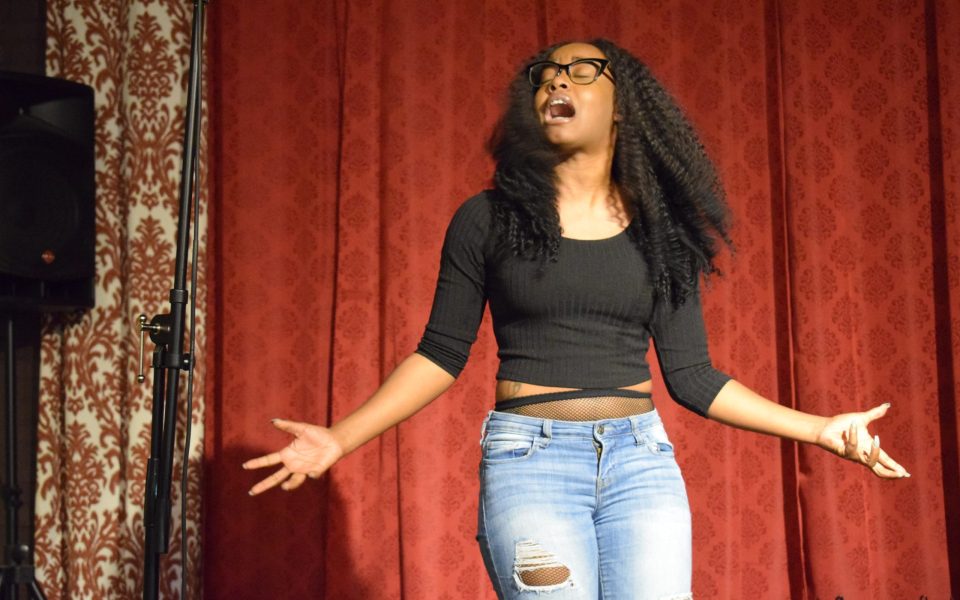Soft R&B filled the intimate space as patrons filtered in, taking seats along a booth-lined wall or glossy, black-leather sofas, some with bottled beers and others with the night’s cocktail special, “Word Play,” in hand. Warm ceiling lights set the scuffed-up, raised stage and a lone mic aglow.
Events coordinator Tiana Bryant hosts Word Play, a slam-poetry competition, the last Saturday of every month at the Artist Bloc, a gallery, coffeehouse and creative meeting space in Greensboro. True to the slam tradition, the night’s emcee, Jermain “Main Man” Monroe, sought out five members of the audience new to poetry slams to serve as judges. Those with freshly anointed powers rated the three-minute performances on a zero to 10 scale on small dry-erase boards. The lowest and highest scores are scrapped in slams for a highest possible score of 30.
Decked out in blue and orange garb, Main Man sacrificed himself as a trial run for the first-time judges, performing an aptly named poem “Sacrifice” about his first slam.
Slam poetry is as physical as it is literary. Nearly every poet began with their back to the crowd facing their backdrop, a burgundy curtain, collecting themselves before turning to deliver the piece, their arms conduits for sending energy to the audience.
Donning all-black attire, Jasmine Williams crooned the opening lines of “Amazing Grace” as prelude to mourning Trayvon Martin and Tamir Rice, tragic examples of black boys who “can’t outrun bullets” and questioned claims of social progress in America.
Ayanna Albertson, too, began in song. After a few lines of Etta James’ “All I Could Do Was Cry,” she recounted seeing her ex-boyfriend with another woman and shared a list of 10 truths about the healing process. She relied on everything from too much ice cream and blasting trap music to realizing that: “4. He wasn’t yours to begin with/ Faithful men cannot be stolen/ Happy homes cannot be broken.” Early on, Albertson demonstrated a masterful ability to oscillate between humor and solemnity, eliciting both laughter and empathetic “Mmh’s” from the crowd. Every poem’s final words packed a punch: “And remember — Adam needed Eve, not the other way around.”
Kisherra Day, who goes by “KD,” disclosed childhood abuse as she gently walked through the audience, compelling attendees to reckon with the trauma she still carries in her flesh, now two or three feet from their own. Though partially veiled by her baggy jeans and baseball cap, her vulnerability shone through.
Hausson Byrd started by addressing the plunder of black bodies through state violence rather than mining personal experience, but changed tacks in the second round. The death of his grandmother set him spiraling into the realization he didn’t know her well enough to write a poem for her funeral.
“The only time I can really grieve is on the stage/ The only time I feel like calling is when they’re in the grave.” Of all contestants, his delivery settled quietest on listener’s ears despite the weight of his words.
The righteously angry pulse of Jugo Alexander’s delivery matched the subject of his second poem, a eulogy of sorts from the perspective of Trayvon Martin as George Zimmerman followed him down the street before killing him. Alexander never confined himself to the stage, favoring movement throughout the room. Whether intentional or not, walking created a visceral association with the experience of his subject and Alexander’s height caused ceiling lights to illuminate his bleach-stained T-shirt and face as he gazed upward and closed with, “I am the light and I am Trayvon Martin.”
Emcee Main Man maintained a light mood between artists’ appeals to God and intimate disclosures without disrespecting the atmosphere. Between one round, he revived a jovial mood singing Guy’s “Let’s Chill” when he couldn’t get a Pandora station to work.[pullquote]Learn more about the Artist Bloc at theartistbloc.com.[/pullquote]
In the third and final round, Alexander delivered yet another ode to black women which, while lovely, seemed a bit hackneyed and veered toward confining black women to pedestals rather than celebrating their humanity. Byrd, though, looked to his future, considering how he might raise a son. Instead of pushing him into what Byrd considers the slave-like conditions of a football career, he would guide him towards academia and away from unhealthy conceptions of masculinity because “he is already good enough.”
Despite admirable performances, no one’s delivery quite matched up against the elegance of Ayanna Albertson’s measured cadence or the breadth of themes she explored.
During her championship encore, Albertson flipped the evening on its head and levelled with her audience about writing poetry about saving her ex-partner from suicide — no humor this round.
“Why is it that poetry has a way of healing everyone but the person who writes it?/ Uses just enough literary devices that you overlook the cry for help/ Consider it a good concept when a poet has a breakdown on stage/… I have learned that not all pain deserves this here platform/… But today, I have chosen not to trigger myself back into trauma, into depression and into grief for the sake/ of writing/ a good/ poem.”
Join the First Amendment Society, a membership that goes directly to funding TCB‘s newsroom.
We believe that reporting can save the world.
The TCB First Amendment Society recognizes the vital role of a free, unfettered press with a bundling of local experiences designed to build community, and unique engagements with our newsroom that will help you understand, and shape, local journalism’s critical role in uplifting the people in our cities.
All revenue goes directly into the newsroom as reporters’ salaries and freelance commissions.


Leave a Reply